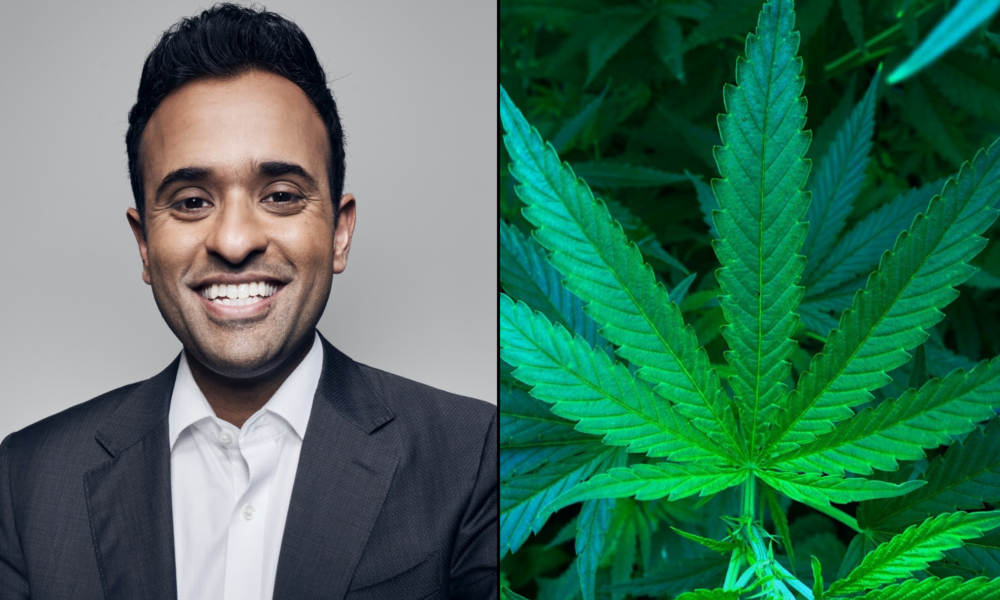Vivek Ramaswamy, a 2024 Republican presidential candidate, says he would federally legalize Schedule I drugs such as marijuana and psychedelics for military veterans with post-traumatic stress disorder (PTSD) if he’s elected. His plan involves having the Department of Veterans Affairs (VA) provide access to the currently illegal substances as an alternative to fentanyl.
During a virtual town hall event ahead of the Iowa caucus, Ramaswamy was asked why medical cannabis hasn’t been federally legalized and took the opportunity to tout his broader drug policy plan for veterans.
He gave a somewhat contradictory response, first saying that there’s a “patchwork” of state cannabis laws under federal prohibition, and that “everything has to go through Congress—that’s a separate matter.” But then he suggested he could unilaterally amend the Controlled Substances Act (CSA) to create a veterans-specific carve-out for Schedule I drugs.
“I believe so many veterans who are suffering from PTSD today are turning to suicide or fentanyl or worse,” he said. “What I believe is that Schedule I drugs should be descheduled for veterans with PTSD to be able to get that as medical care through the VA—far better than fentanyl or suicide or other places they’re turning.”
“That’s something that I will be able to do as the next president of the United States, and that’s where my focuses is, in at least bringing some sensibility into the way that we’re applying the federal drug scheduling,” Ramaswamy said. “Veterans with PTSD do deserve greater access to medical choice through the VA system, and that’s what I stand for.”
If elected president, Ramaswamy could direct federal agencies to carry out a review into drug scheduling—as President Joe Biden has done for cannabis—or he could encourage Congress to address the issue. But he could not independently deschedule substances from the CSA.
Also, while the candidate said he supports broadly legalizing Schedule I drugs, it’s likely he’s referring to his veterans plan to deschedule cannabis and certain psychedelics for that population.
At a separate campaign event in Iowa last month, Ramaswamy spoke with an attendee who voiced support for the therapeutic use of certain psychedelics. Ramaswamy said that he agreed there’s a need to make plant-based medicines available, though he wants to start with veterans suffering from PTSD.
The candidate, whose overall drug policy platform has evolved in several, sometimes conflicting, ways over his campaign—including backing federal marijuana legalization while voting against a statewide initiative to end cannabis prohibition on Ohio’s ballot—said last month that he supports “decriminalizing ayahuasca & ketamine for veterans suffering from PTSD, to prevent the epidemic of fentanyl & suicide.”
Ramaswamy would “de-schedule schedule 1 drug restrictions that stand in the way of Veterans with PTSD enjoying access to substances that can assist in their treatment and recovery: marijuana, ayahuasca/DMT [Dimethyltryptamine], and MDMA [methylenedioxymethamphetamine],” his veterans plan says.
On cannabis policy, meanwhile, the candidate has taken issue with how Ohio’s voter-approved legalization law appropriated some cannabis tax revenue for social equity programs—but he also voiced opposition to states preempting federal law.
Ramaswamy has also confused the reform community by calling on the federal government to expand the Drug Enforcement Administration (DEA). During a domestic policy speech in September, he detailed a proposal to fire about 75 percent of federal workers and shutter key agencies, but DEA would be exempt, while agents at the FBI would be transferred over to the drug agency.
Top Biden Health Official In Touch With DEA About Marijuana Rescheduling Recommendation
Read More Feedzy

